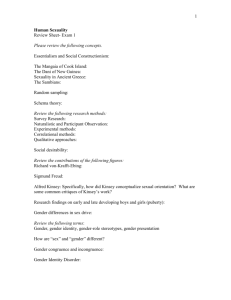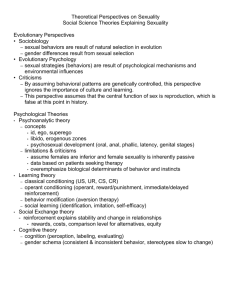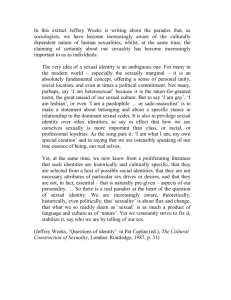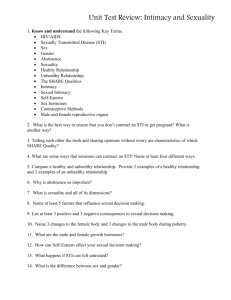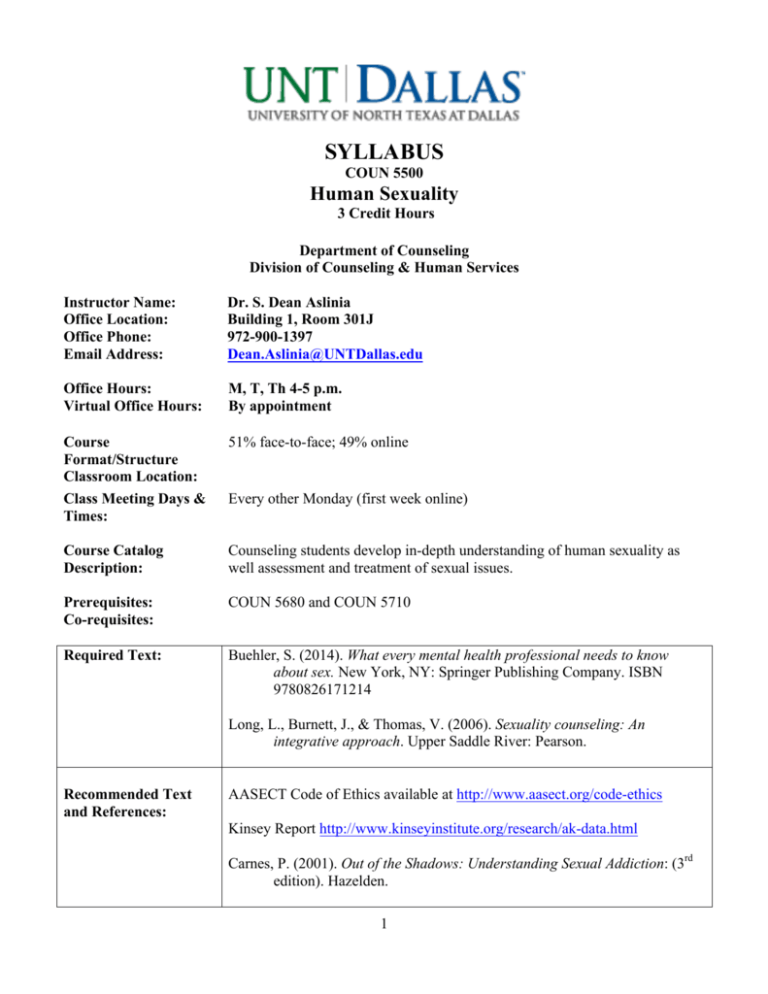
SYLLABUS
COUN 5500
Human Sexuality
3 Credit Hours
Department of Counseling
Division of Counseling & Human Services
Instructor Name:
Office Location:
Office Phone:
Email Address:
Dr. S. Dean Aslinia
Building 1, Room 301J
972-900-1397
Dean.Aslinia@UNTDallas.edu
Office Hours:
Virtual Office Hours:
M, T, Th 4-5 p.m.
By appointment
Course
Format/Structure
Classroom Location:
Class Meeting Days &
Times:
51% face-to-face; 49% online
Course Catalog
Description:
Counseling students develop in-depth understanding of human sexuality as
well assessment and treatment of sexual issues.
Prerequisites:
Co-requisites:
COUN 5680 and COUN 5710
Required Text:
Buehler, S. (2014). What every mental health professional needs to know
about sex. New York, NY: Springer Publishing Company. ISBN
9780826171214
Every other Monday (first week online)
Long, L., Burnett, J., & Thomas, V. (2006). Sexuality counseling: An
integrative approach. Upper Saddle River: Pearson.
Recommended Text
and References:
AASECT Code of Ethics available at http://www.aasect.org/code-ethics
Kinsey Report http://www.kinseyinstitute.org/research/ak-data.html
Carnes, P. (2001). Out of the Shadows: Understanding Sexual Addiction: (3rd
edition). Hazelden.
1
Haffner, D. W. (2008). From Diapers to Dating. (4th edition). Newmarket
Press. New York: New York.
Haffner, D. W. (2008). Beyond the Big Talk. (3rd edition). Newmarket Press.
New York: New York.
Kaufman, M., Silverberg, C., & Odette F., (2007). The Ultimate Guide to Sex
and Disability. Cleis Press.
Standards of Care: The World Professional Association for Transgender
Health (2012). WPATH. Version 7 available at
http://www.wpath.org/site_page.cfm?pk_association_webpage_menu=
1351&pk_association_webpage=3926
Access to Learning
Resources:
UNT Dallas Library:
phone: (972) 780-3625;
web: http://www.unt.edu/unt-dallas/library.htm
UNT Dallas Bookstore:
phone: (972) 780-3652;
e-mail: 1012mgr@fheg.follett.com
Course Goals or Overview:
This course is intended for counseling students to develop in-depth understanding of human
sexuality as well assessment and treatment of sexual issues. The course is designed to
develop:
a) students’ knowledge base related to human sexuality,
b) an understanding of the varied sexuality issues which may be encountered in professional
counseling practice,
c) students’ skills in assessment and intervention skills with sexuality issues and
d) increased awareness of one’s personal perceptions, attitudes and affect related to
sexuality issues.
Course participants will become more effective in identifying, assessing and intervening
with human sexuality related counseling issues.
Learning Objectives/Outcomes:
1
At the end of this course, the student will:
Student Learning Outcome (SLO)
Discuss the history and significant research in human sexuality
Evaluation/Outcome
Discussion Board
and Quiz
2
Identify and describe the dynamics associated with healthy sexual
functioning. Identify male and female sexual functioning, anatomy,
physiology, and research on the sexual response cycle.
Discussion Board
and Quiz
3
Identify components of healthy sexual development and ways that
parents can foster healthy sexual attitudes and behavior in children and
adolescents
Discussion Board
and Quiz
2
4
Demonstrate self-awareness of one’s own sexual development and
sexuality, including the impact on self and intimate relationships.
5
Demonstrate self-regulation of anxiety and embarrassment as well as
Video Demo and
unconditional positive regard and acceptance of other’s sexuality, sexual Analysis
development, sexual expression, and sexual trauma.
6
Identify theories and assessments applied to sexuality counseling.
Discussion Board
and Quiz
7
Discuss and explore gender differences specific to sexual functioning
and the impact of gender role expectations on sexual.
Discussion Board
and Quiz
8
Demonstrate clinical interviewing, assessment, diagnosis, treatment
planning, and counseling skills related to sexuality issues, sexual
dysfunction, and sexual problems.
Video Demo and
Analysis
9
Identify the sexually transmitted infections and the associated risk
factors
Discussion Board
and Quiz
10
Explore the sexual orientation continuum and issues affecting gay,
lesbian, bisexual, and transgendered (LGBT) individuals and couples.
Discussion Board
and Quiz
11
Discuss and discern assessment, DSM V diagnosis and treatment of
male sexual concerns, female sexual concerns, and heterosexual and
LGBT couple concerns.
Discussion Board
and Quiz
12
Discuss and discern assessment, DSM V diagnosis and treatment of
concerns related to aging, atypical sexual behaviors (paraphilias,
addiction, polyamory, bdsm, hyper-sexuality, sexual dysfunction), and
survivors of sexual trauma.
Discussion Board
and Quiz
13
Discuss factors that may influence sexuality during pregnancy and
pregnancy termination, contraception, family planning, and fertility.
Describe the physiological, social, and emotional issues for individuals
and couples in dealing with infertility and infidelity.
Discussion Board
and Quiz
SLO
7, 10
3, 6, 8, 11, 12, 13
7, 10
1, 2, 3, 4
11, 12
1-13
Self-Assessment
Paper
COAMFTE STANDARDS
•Key Element II-A: Multiculturally-informed Education Approach
•Key Element II-B: Multiculturally-informed Education Approach
•Key Element II-C: Multiculturally-informed Education Approach
•FCA 2: Clinical Treatment with Individuals, Couples, & Families
•FCA 3: Diverse, Multicultural and/or Underserved Communities
•FCA 6: Biopsychosocial Health and Development Across the Life Span
•FCA 7: Systemic/Relational Assessment & Mental Health Diagnosis
Treatment
FCA 8: Contemporary Issues
3
SLO
11, 12, 13
8, 11, 12
1, 2, 3
12, 13
1-13
8, 11, 12
6
6
CACREP STANDARDS: Marriage, Couple, and Family Counseling
A7: Understand effects of trauma, crisis
B2: Select techniques appropriate to couples’/families’ presenting problems
C1: Knowledge of family life-cycle, healthy functioning
C2: Recognizes specific problems couples/families
C3: Understands human sexuality and impact on family and couple
F1: demonstrates ability to provide effective services (demonstrate by taping)
G1: knows models of assessment with couples and families
G2 Understands family and couple assessment tools
4
Course Outline
This schedule is subject to change by the instructor. Any changes to this schedule will be communicated
by Blackboard Announcements and Email.
Timeline
Week #
1
TOPICS
Introduction to
Human Sexuality,
History & Research in
Sexuality
Related
SLO
1, 2
2
Fundamentals of
Sexual Health,
Anatomy, language,
Assessment,
Reproduction
1, 2
3
Theories Applied to
Sexuality Counseling
6, 11
Readings/ Activities/Assignments
•Buehler Chapter 1 & 2
•Discussion Board and Quiz
•http://aasect.org/ - review before class. You can use
this site to find resources for different subjects that we
will discuss in class.
•http://dbhnow.com/wpcontent/uploads/2011/03/Comfort-and-WillingnessScale.pdf – print this survey and complete it.
•Students will sign up for the topic for the Sexuality
Counseling/Therapy Project
•Attitudes regarding sexual practices: http://www.etarocchi.com/sa/sa.php
•Sex needs a new metaphor that is non-competitive –
like pizza:
http://www.ted.com/talks/al_vernacchio_sex_needs_a_n
ew_metaphor_here_s_one
•Buehler, Chapters 3-4, 14
•http://www.sex-lexis.com – take some time browsing
the website, write down 10 (or more) concepts that you
were not familiar with before.
•Be prepared to talk about the sexual anatomy and
reproduction. How would
you discuss it with your clients
•Take some time to explore the main sexuality
organizations website –
AASECT, SSSS, SSTAR (links provided below)
•Sexual equality: http://www.upworthy.com/what-ifevery-guy-were-open-to-having-sex-like-this-guy-wedhave-some-very-satisfied-ladies?c=ufb1
•Does the G Spot exist?
http://www.huffingtonpost.com/2014/10/09/g-spotvaginal-orgasmmyth_n_5947930.html?ncid=fcbklnkushpmg00000063
•10 things you didn’t know about orgasm:
http://www.ted.com/talks/mary_roach_10_things_you_
didn_t_know_about_orgasm?utm_content=awesmpublisher&utm_campaign=&utm_medium=on.ted.comfacebookshare&awesm=on.ted.com_a0Ugx&utm_source=facebo
ok.com&language=en
•Long Chapter 1 & 2
•Buehler chapter 8
5
and Counseling for
Couples
4
Assessment in
Sexuality Counseling
11, 12
5
Goal setting,
treatment planning,
and interventions in
sexuality counseling
Maintaining and
Validating New
Perceptions and
Behaviors in
Sexuality Counseling,
Ethics of Sex Therapy
Parenting: appropriate
sex education for
children and
adolescents
9, 10
6
7
2, 3, 4, 5
3
8
Female Sexuality:
Diagnosis &
Treatment
7, 8
9
Male Sexuality:
Diagnosis &
Treatment
7, 8
•Discussion Board and Quiz
•Nine common sexual problems for couples:
http://www.huffingtonpost.com/2014/11/03/commonsex-problemsexperts_n_5978560.html?ncid=fcbklnkushpmg0000006
3
•Long Chapter 3
•Buehler Chapter 5
•Discussion Board and Quiz
•Long Chapter 4
•Discussion Board and Quiz
•Long Chapter 5
•Buehler Chapter 19, 20
•Discussion Board and Quiz
•Buehler Chapter 9
•http://www.prenhall.com/divisions/hss/app/miracle/ch1
4/ch14.html# - Take the survey and know your score.
•If driver’s ed was taught like sex ed:
http://www.youtube.com/watch?v=1SMVGo0o2DM
•Sex ed by state: http://www.upworthy.com/get-readyto-be-horrified-at-what-schools-are-telling-kids-aboutsex?c=ufb3
You will not have to share it with class.
•Talking to kids about sex:
http://media.oprah.com/lberman/talking-to-kids-aboutsex-handbook.pdf
•Is sexting normal behavior for teens?
http://psychcentral.com/news/2014/10/07/is-sextingnormal/75876.html
•For fun: What if Hogwarts had a mandatory sex ed
class: http://io9.com/what-if-hogwarts-had-amandatory-sex-ed-class1646753786?utm_source=nar.al&utm_medium=urlshor
tener&utm_campaign=FB
•Long Chapter 6
•Buehler Chapter 6, 13
•Discussion Board and Quiz
•Look over DSM-V – review sexuality dysfunction
classification
•Self-Assessment paper due
•Long Chapter 7
•Buehler Chapter 7
•Discussion Board and Quiz
6
11, 12
10
11
12
Sexually Transmitted
Infections/Diseases
Counseling Sexual
Minority Couples
(LGB); Transgender
Individuals &
Couples
9
10
Aging and Health
Related Issues in
Sexuality
Sexuality Counseling
and Sexual
Variations/Atypical
Sexual Behavior
12
14
Counseling Couples
and individuals
regarding Pregnancy,
Contraception, and
infertility issues, and
infidelity
13
15
Counseling Survivors
of Sexual Trauma
including Rape or
Incest and their
partners
12
13
12
•Look over DSM-V – review sexuality dysfunction
classification
•Sex for males: why they sometimes don’t want sex:
http://www.psychologytoday.com/blog/married-andstill-doing-it/201403/the-4-hidden-reasons-some-mendont-wantsex?utm_source=FacebookPost&utm_medium=FBPost
&utm_campaign=FBPost
•Assessment Role Play and Video Tape Due
•Long Chapter 8
•Discussion Board and Quiz
•Long Chapter 9
•Buehler Chapter 10
•http://www.wpath.org/site_page.cfm?pk_association_
webpage_menu=1351&pk_association_webpage=3926
•Discussion Board and Quiz
•http://www.newrepublic.com/article/119627/what-itstransgender-person-transition
•Long Chapter 10
•Buehler Chapter 16
•Discussion Board and Quiz
•Long Chapter 11
•Buehler Chapter 11, 17, & 18
•Discussion Board and Quiz
•Pedophilia is a disoder article:
http://www.nytimes.com/2014/10/06/opinion/pedophilia
-a-disorder-not-a-crime.html?src=twr&_r=0
•Long Chapter 14
•Discussion Board and Quiz
•Birth control equality video:
http://www.huffingtonpost.com/2014/10/06/buyingcondoms-birth-controlbuzzfeed_n_5938896.html?ncid=fcbklnkushpmg000000
63
Interesting facts about condoms:
•http://www.upworthy.com/6-facts-about-condoms-thatexplain-these-hilariously-bad-stock-photos?c=ufb1
•Special Topics Power Point Presentation Due
•Long Chapter 12, 13
•Buehler Chapter 12
•Discussion Board and Quiz
•Sexual abuse victims speak out:
**http://aplus.com/a/sexual-abuse-violence-survivorsfight-back-project-unbreakable
•rape culture: http://www.upworthy.com/this-17-yearold-explains-why-rape-is-never-a-mistake-whats-scaryis-who-hes-talking-to?c=ufb1
7
Assignment:
**http://www.washingtonpost.com/blogs/she3the3
people/wp/2014/11/13/27365/
Read above story and write a reflection paper on:
(a)>your>personal>response>to>her>story,>>
(b)>client’s>>steps>toward>healing,>>
(c)>cognitive>distortions>and>balanced>thoughts>along>the>
process,>and>>
(d)>key>components/concepts>of>narrative>therapy.
16
Review/Wrap-Up
11, 12
•Counseling Role Play and Video Tape Due
Course Evaluation Methods
This course will utilize the following instruments to determine student grades and proficiency of the
learning outcomes for the course.
1.! Attendance, participation, and professionalism are professional responsibilities.
2.! Discussion Boards regarding textbook chapters and SLO’s will be posted on Blackboard each
week. Students are to answer the questions and respond to two other classmates.
3.! Quizzes for each textbook chapter will be open book and administered online unless otherwise
noted.
4.! Special topics PowerPoint presentation will cover definition and description, etiology, impact,
evidenced based interventions, treatment plan, bibliography, and resource list. Special topics
related to sexual concerns discussed in the textbook will be collaboratively assigned the first
night of class.
5.! Sexuality Self-Assessment: Students will write a four page confidential paper on their own
(a) significant perceptions, attitudes and assumptions regarding gender roles and sexuality
issues,
(b) influences on their own sexual development, and
(c) evidence-based strategies to enhance their own sexuality.
6.! Sexuality Counseling Assessment Demonstration: Students will video tape a role play of
counseling someone with a sexual concern and will complete an analysis based on a form and
rubric that will be posted on Blackboard.
7.! Sexuality Counseling Intervention Demonstration: Students will video tape a role play of
counseling someone with a sexual concern and will complete an analysis based on a form and
rubric that will be posted on Blackboard
8
Grading Matrix:
Instrument
Discussion Board
Quizzes
Special Topics Presentation
Sexuality Self-Assessment
Paper
Sexuality Counseling
Assessment Demonstration
Sexuality Counseling
Intervention Demonstration
Attendance/Participation
Measures
SLO
1-13
1-13
1-13
3
Value (points or
percentages)
13 x 10 points
13 x 10 points
120
50 points
Total
130
130
120
50
9, 10
50 points
100
9, 10
75 points
75
1-13
75 points
Total
75
680
Grade Determination:
A = 680 – 612 pts; i.e. 90% or better
B = 611 – 544 pts; i.e. 80 – 89 %
C = 543 – 476 pts; i.e. 70 – 79 %
D = 475 – 408 pts; i.e. 60 – 69 %
F = 407 pts or below; i.e. less than 60%
INFORMED CONSENT: Due to the sensitive nature of the topic of this course, students are advised in
advance to consider the following issues in taking this course:
1.! By remaining enrolled in this course beyond the first day of class, you are agreeing that you
understand the points below and that you are willing to take part in this course.
2.! Remaining in the course also indicates your agreement that you are willing to participate in
assignments that are indicated in the syllabus for this course.
3.! At times, controversial sexual topics may be discussed in this course. It is expected that students
may experience reactions to these topics, and many students have already established opinions and
values related to these topics. Although it is not necessary for students to agree with one another
related to any controversial issues discussed in this course, students must agree to remain
respectful of their classmates throughout the course.
4.! Personal definitions of sexually graphic images and sexually explicit language vary widely. The
instructor will present images and use language that could be considered offensive to some
students. However, the nature of the course requires that topics of conversation and images that
may be considered by some to be “taboo” or uncomfortable are addressed. The intention of
presenting such material is for clinical instruction and the instructor will give careful consideration
to the educational merit of such material in class. Students are asked to give the same careful
consideration when they are bringing new material to the class through assignments and class
discussions. Any questions regarding the appropriateness of materials students plan to present
should be discussed with the instructor prior to presenting the material to the class.
9
5.! This class may involve student self-reflection related to examining one’s personal values, beliefs,
and biases surrounding human sexuality issues. It is expected that each student remain open to this
self-reflection throughout the course. The purpose of this self-reflection is to prepare students for
managing their reactions, value conflicts, and biases that may arise when working with clients
about sexuality issues that may negatively impact their clinical effectiveness with these
individuals.
6.! This course involves student participation and class discussion. Please note that this class is an
educational and not a counseling experience. Therefore, self-disclosure of personal experiences
related to sexuality is not expected. However, students may at times wish to share personal
experiences related to the topics addressed in this course. In these situations, students should give
careful consideration to their intentions for sharing such material and should share only the
minimal amount of information required to convey the intended point.
7.! Although students may feel uncomfortable at times during this course, they are encouraged to use
professional behavior to self-regulate their own anxiety. Students are permitted to excuse
themselves from the classroom when they deem necessary if the course activities or content is
beyond their ability to self-regulate.
8.! During class activities, students may share personal information about themselves and their
families. Please respect the privacy and confidentiality of other students in this class, and adhere to
professional confidentiality standards. Likewise, all materials submitted to the instructor is treated
as confidential information.
University Policies and Procedures
Students with Disabilities (ADA Compliance):
The University of North Texas Dallas faculty is committed to complying with the Americans with
Disabilities Act (ADA). Students' with documented disabilities are responsible for informing faculty of
their needs for reasonable accommodations and providing written authorized documentation. Grades
assigned before an accommodation is provided will not be changed as accommodations are not
retroactive. For more information, you may visit the Student Life Office, Suite 200, Building 2 or call 972780-3632.
Student Evaluation of Teaching Effectiveness Policy:
The Student Evaluation of Teaching Effectiveness (SETE) is a requirement for all organized classes at
UNT. This short survey will be made available to you at the end of the semester, providing you a chance
to comment on how this class is taught. I am very interested in the feedback I get from students, as I work
to continually improve my teaching. I consider the SETE to be an important part of your participation in
this class.
Assignment Policy:
Each assignment will be provided with its own specific set of instructions; students will be expected to
follow set instructions.
Exam Policy:
Exams should be taken as scheduled. No makeup examinations will be allowed except for documented
emergencies (See Student Handbook).
10
Academic Integrity:
Academic integrity is a hallmark of higher education. You are expected to abide by the University’s code
of academic integrity policy. Any person suspected of academic dishonesty (i.e., cheating or plagiarism)
will be handled in accordance with the University’s policies and procedures. Refer to the Code of
Academic Integrity at http://www.unt.edu/untdallas/policies/Chapter%2007%20Student%20Affairs,%20Education,%20and%20Funding/7.002%20Co
de%20of%20Academic_Integrity.pdf
In addition, all academic work turned in for this class, including exams, papers, and written assignments
as follows:
On my honor, I have not given, nor received, nor witnessed any unauthorized assistance that violates
the UNTD Academic Integrity Policy.
Bad Weather Policy:
On those days that present severe weather and driving conditions, a decision may be made to close the
campus. In case of inclement weather, call UNT Dallas Campuses main voicemail number (972) 7803600 or search postings on the campus website www.unt.edu/dallas. Students are encouraged to update
their Eagle Alert contact information, so they will receive this information automatically.
Attendance and Participation Policy:
The University attendance policy is in effect for this course. Class attendance and participation is
expected because the class is designed as a shared learning experience and because essential information
not in the textbook will be discussed in class. The dynamic and intensive nature of this course makes it
impossible for students to make-up or to receive credit for missed classes. Attendance and participation in
all class meetings is essential to the integration of course material and your ability to demonstrate
proficiency. Students are responsible to notify the instructor if they are missing class and for what
reason. Students are also responsible to make up any work covered in class. It is recommended that each
student coordinate with a student colleague to obtain a copy of the class notes, if they are absent.
Missing 2 or more classes will result in a lowering of a letter grade.
Diversity/Tolerance Policy:
Students are encouraged to contribute their perspectives and insights to class discussions. However,
offensive & inappropriate language (swearing) and remarks offensive to others of particular
nationalities, ethnic groups, sexual preferences, religious groups, genders, or other ascribed statuses will
not be tolerated. Disruptions which violate the Code of Student Conduct will be referred to the Center for
Student Rights and Responsibilities as the instructor deems appropriate.
11
Counseling 5500 Sexuality in Family and Couples Counseling
Informed Consent to Attend Class
This class is designed to train therapists to work with individuals and couples who are experiencing
sexual problems. Consequently, the course will deal with sensitive and controversial topics. A good deal
of the content matter of the course will be sexually explicit and will contain strong language. The sexually
explicit material will include full nudity, sex acts, visual examination of male and female genitalia, as
well as verbal comments about sexual activities and preferences.
Couples and family therapists deal with a wide variety of people who are experiencing varying degrees of
emotional and physical distress. The language they use to discuss their concerns may be considered
profane, vulgar, or obscene. The intent of this class is to prepare therapists to deal with both the content
and language expressed by clients. Therefore students must be exposed to material that some may
consider offensive.
If participating in the class becomes distressful for you, please contact, the instructor, as soon as you are
aware of the distress. The instructor cannot provide therapy for you but can refer you to an appropriate
person if necessary. The instructor will do what I can to help you adjust to the material presented.
However, to become a practicing couples and family therapist, it is essential that you both understand and
are able to emotionally deal with the material covered in class.
To be involved in this course, it is necessary that you read and sign the attached statement:
I fully understand that this course covers the above outlined sexuality issues, assessment, treatment of
sexual victimization, and sexual dysfunction and contains sexually explicit material as discussed in the
syllabus and course schedule.
I further understand that the material covered may cause me emotional distress. I understand that the
intent of the instructor is to prepare me to work with people who are experiencing sexual difficulties. I
understand that it is necessary for me to be exposed to this material. I agree to view and hear this material
and will not consider it to be a form of sexual harassment.
I further agree to alert the instructor if course material is causing me undue distress. I understand that the
instructor continues to be bound by university regulations regarding sexual harassment and that I have not
given up my right to file a grievance if I judge her behavior to be inappropriate.
I understand that if I think I might be offended by this material, I should not take this course.
Name: _______________________________________
Signature: _____________________________________ Date: ___________________
12





